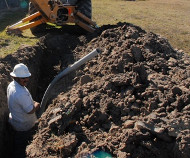8/10/2017
Subcontractors Shafted In Texas Toll Road FailureBankrupt Texas toll road stiffs subcontractor who goes to the second highest court in the state in a five-year battle over payment.

Nearly every major US toll road project has gone bankrupt or required a government bailout. When this happens, little attention is given to the construction crews who worked on the project that go unpaid. This is what happened to Dig Tech, a small Texas firm that had a deal to dig trenches and install the electrical conduit for the ill-fated SH130 toll project segments 5 and 6 that went bankrupt last year.
The Texas Department of Transportation signed a deal with Cintra, a Spanish firm, to run the toll road. Cintra then hired contractors like Star Operations who in turn hired subcontractors, including Dig Tech. The result was a complicated chain of contracts that required a lengthy and expensive court challenge before the family-owned firm could be paid. Last month, the Texas Court of Appeals upheld a jury's decision to award $228,524 to Dig Tech.
There is no dispute that Dig Tech fully completed the work by April 4, 2012. The small firm sent a letter to Star Operations asking why its invoices for the work were being ignored. The widespread problems with the toll road's financial viability became public shortly afterward. Moody's in 2013 cited the project's $1.1 billion debt in its decision to give the scheme a negative rating. SH130 never lived up to the overly optimistic traffic forecasts.
Dig Tech was left with no choice but to sue against Star Corporation's payment bond. Over the course of ten days, a jury reviewed emails and other records to find that there was no legitimate excuse for the family-owned firm not to be paid. The jury found that Star Corporation had "unclean hands" in the deal.
Star Corporation and its insurance company, Great American, decided to appeal the decision on highly technical grounds based on whether the contract between Dig Tech and Star Corporation should be considered under federal or state rules and whether Dig Tech complied with legal notice requirements. The three-judge appellate panel found no reason to overturn the jury's decision.
"The Texas legislature passed the McGregor Act to create a method to ensure that subcontractors and suppliers on public-works projects are paid for their labor and materials because they generally may not place liens against public buildings or other public works," Justice Cindy Olson Bourland wrote for the court. "As an initial matter, Star and Great American fail to explain why lack of notice to SH 130 Concession should preclude Dig Tech from recovery on the bond, when Dig Tech notified the three parties named on the bond -- the obligee, Central Texas; the principal and obligor, Star; and the surety, Great American."
The court did find that the trial court improperly awarded Dig Tech compensation for the cost of copying deposition transcripts. A copy of the ruling is available in a 250k PDF file at the source link below.


